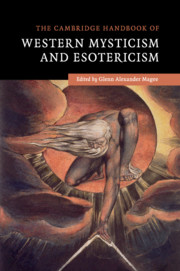Book contents
- Frontmatter
- Dedication
- Contents
- Acknowledgments
- Editor's Introduction
- List of contributors
- I ANTIQUITY
- II THE MIDDLE AGES
- III THE RENAISSANCE AND EARLY MODERNITY
- IV THE NINETEENTH CENTURY AND BEYOND
- V COMMON THREADS
- 30 Alchemy
- 31 Astrology
- 32 Gnosis
- 33 Magic
- 34 Mathematical Esotericism
- 35 Panpsychism
- 36 Sexuality
- Suggestions for Further Reading
- Index
- References
33 - Magic
from V - COMMON THREADS
Published online by Cambridge University Press: 05 May 2016
- Frontmatter
- Dedication
- Contents
- Acknowledgments
- Editor's Introduction
- List of contributors
- I ANTIQUITY
- II THE MIDDLE AGES
- III THE RENAISSANCE AND EARLY MODERNITY
- IV THE NINETEENTH CENTURY AND BEYOND
- V COMMON THREADS
- 30 Alchemy
- 31 Astrology
- 32 Gnosis
- 33 Magic
- 34 Mathematical Esotericism
- 35 Panpsychism
- 36 Sexuality
- Suggestions for Further Reading
- Index
- References
Summary
Introduction
Magic is a wretched subject. Perhaps no other concept in the study of religion has caused so much confusion and frustration among scholars, because it seems to resist all attempts at defining its exact nature, thus causing serious doubts about whether it refers to anything real at all – or if so, in what sense. In spite of all the trouble that the concept has caused, nobody has seemed capable of exorcizing it from the academic vocabulary. Like the monster in cheap horror movies, “magic” always keeps coming back no matter how often one tries to kill it.
To explain this strange situation, we must begin by distinguishing sharply between two ways of understanding magic. On the one hand, we can look at the many different meanings and connotations that the term has acquired in Western culture from antiquity to the present. We will see that this gets us closest to understanding the actual role of magic in the context of Western esotericism. On the other hand, there is the common use of “magic” as a general reified concept that is part of the triad “magic–religion–science.” We will see that this latter perspective is the chief cause of all the confusion about the term. Thus, before getting to magic in the history of Western esotericism, we will begin with this second perspective.
The Reification of “Magic”
Although there are countless academic definitions of magic, they are essentially variations on three extremely influential theories. First, there is the “intellectualist” approach, associated with the work of the two famous Victorian armchair anthropologists Edward Burnett Tylor and James G. Frazer. Tylor, the nineteenth-century pioneer of cultural anthropology, defined magic as based on “the error of mistaking ideal analogy for real analogy.” In other words, he claimed that it was grounded in the erroneous assumption typical of “primitive man” that things associated in thinking must be connected in actual fact. Frazer integrated Tylor's theory in his famous evolutionist triad, claiming that humanity had progressed from primitive “magic,” first to the higher level of “religion,” and from there to “science,” the highest level of all.
- Type
- Chapter
- Information
- The Cambridge Handbook of Western Mysticism and Esotericism , pp. 393 - 404Publisher: Cambridge University PressPrint publication year: 2016
References
- 4
- Cited by



